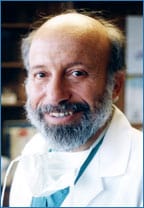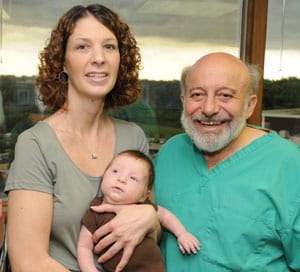
Jewish Light, September 2010

An internationally renowned infertility specialist, Dr. Sherman Silber invented most of the modern infertility treatments — including vasectomy reversal and tubal ligation reversal — and he developed microsurgical sperm retrieval for men who were thought to have no sperm. He also has improved dramatically the success rate for in vitro fertilization and has perfected embryo freezing techniques. More recently, Silber pioneered the preservation of fertility in cancer patients using egg freezing and ovarian transplantation. Thirteen years ago, Silber froze the ovary of a young St. Louis area woman who was facing cancer treatments that would destroy her fertility. Last year, he transplanted that tissue back into her body, and this May, that women gave birth — the first cancer survivor in the United States to do so as a result of Silber’s research.
“A lot of breakthroughs in my career have resulted in babies, but this one makes me walk around with a special bounce in my step,” says Silber, 68, director of the Infertility Center of St. Louis at St. Luke’s Hospital. He also is a scientific collaborator at the Massachusetts Institute of Technology in Cambridge, Mass., a full professor at the University of Amsterdam and a full collaborator at the Kato Ladies Clinic in Tokyo. Silber also works with infertility specialists in Israel.
Amy Tucker, the new mom of a baby boy she never expected to have, lives in Columbia, Ill., with her husband, Jason, and their son, Grant Patrick, who is two months old. “Words can’t describe this experience, but it is definitely the most rewarding thing I have ever done,” says Tucker, 32, a nurse in outpatient oncology at St. Louis Children’s Hospital.
At the age of 19, Tucker was diagnosed and treated for Hodgkin’s lymphoma. When the cancer returned, a nurse suggested to Tucker that she speak with Silber about freezing one of her ovaries, as future cancer treatments were certain to leave Tucker sterile. “Dr. Silber explained the procedure was experimental, that there were no guarantees of preserving my fertility, but I figured it couldn’t hurt,” says Tucker. In remission since 2001, last year Tucker and her husband opted to see if the frozen tissue could help her conceive.
In January 2009, Silber placed three pieces of her own frozen tissue into Tucker ’s remaining ovary, which had shut down as a result of the chemotherapy, radiation and a bone marrow transplant that saved Tucker’s life. Using microsurgery, Silber attached the thawed ovarian tissue in a procedure that has earned him acclaim in scientific medical journals, including the New England Journal of Medicine. Then, along with the Tuckers, he waited.

“Dr. Silber was always positive and supportive, and he encouraged us to relax,” Tucker recalls. “By June last year I had my first period and I was pregnant by December.” Tucker adds that though it has sometimes been difficult to be the center of so much attention, she is excited that her success story offers hope to other women who have entered menopause prematurely due to cancer treatments.
“It’s fantastic when you think about what a big deal this is,” says Silber. “One in every 250 women of reproductive age in this country is a cancer survivor who has been sterilized by her treatments, and 90 percent of these young women will have a permanent long-term cure. But if their ovaries or eggs are not frozen, they will be sterilized by that cure.”
Dr. Silber’s colleagues agree that the success of the procedure is a big deal. “Dr. Silber is a leading surgeon in the area of oncofertility — fertility preservation for cancer patients,” says Teresa K. Woodruff, a professor at Northwestern University, the founder and director of the Institute for Women’s Health Research and director of both the Center for Reproductive Research and the Oncofertility Consortium®, which explores the reproductive future of cancer survivors. “He is passionate about his work and cares for patients and their future families.”
Some say it is ethically unsound for women to have the procedure because they choose to postpone childbearing. Silber calls that “old thinking” and notes that the procedure is “now established, thanks to work I began in St. Louis in 1996.” He adds that in a conversation in 2008 with Hillary Clinton, she told him that preserving fertility in women for any reason was “a no-brainer.”
For now, Silber is taking aim at insurance companies. “Insurance companies will not pay to protect women from the chemical or radiological castration that occurs as a result of their cancer treatments,” says Silber. “That may even be illegal — it certainly is immoral — and it has got to change.”
Silber notes that insurance pays for breast reconstruction for women after a mastectomy due to cancer and insurance pays for a penile prosthesis and Viagra for men after prostate cancer surgery. “I think if a patient is covered for cancer treatment, you need to pay for complications caused by those treatments — all of them,” says Silber. “Not to do so is discrimination against women and against family building.”
Silber speaks often with elected officials about this concern. “Dr. Silber is morally and ethically and professionally dedicated to the care and treatment of cancer survivors,” says Kathy Waltz, congressional outreach coordinator for Congressman Russ Carnahan (D-Mo.). “Dr. Silber has been working with Congressman Carnahan to develop a plan to introduce legislation directed at coverage for internal reconstruction for cancer survivors when surgery or other medical treatment has caused destruction of part of the patients’ bodies.”
The father of three grown children and grandfather of seven, Silber lives in Frontenac with his wife, Joan, who is active on numerous boards and is involved in improving education in the inner city. “In truth, I live more at St. Luke’s, where I put in 80-hour work weeks,” says Silber. In his spare time, Silber enjoys theater, opera and music, and the Silbers travel from time to time to a lodge in a remote area of Alaska, a place they learned to love when he was posted in the state with the Public Health Service in 1967.
Brought up in Chicago, Silber claims he knew he wanted to be a doctor by the time he was five years old. “I grew up in a poor neighborhood — the same one where President Obama did his early community organizing,” says Silber. “In those days, there were no drugs or guns, so you just got beat up a lot. It was character building. My parents said, ‘You’re a Jewish boy. Become a doctor and get out of the neighborhood.’”

Silber is the author of three medical textbooks, five best-selling books for lay readers and more than 200 scientific papers on human infertility and reproduction. He has appeared numerous times on such popular shows as “Oprah” and “Charlie Rose” and also on CNN and NPR radio. His patients come to St. Louis from every state in the U.S., all over Europe, South America, the Middle East, Asia and Africa.
In recent years, Silber headed the clinical team at MIT that first mapped and sequenced the Y chromosome in infertile men and that invented sperm retrieval techniques for men who otherwise would have no sperm. “We think there are a similar number of genes on the X chromosome, and we’re now working on a whole genome analysis with men who have various sperm counts,” says Silber.
He also is paying close attention to what Silber calls “an infertility epidemic” throughout the world related to social change. “For example, the Japanese economy is a demographic disaster. Why is their economy in the doldrums? Because they have so few children,” he says. “They are the greatest manufacturers, the most efficient exporters — but 50 percent of Japanese will be of retirement age in a few decades because of low fertility.”
Silber is working closely with Japanese scientists to make in vitro fertilization more effective and more affordable. “With good freezing technology, we can help older women get pregnant relatively inexpensively using low doses of less expensive drugs,” he says. “In fact, I am going to Japan this week to address a meeting on this topic — I am thrilled about this work.”
See also:
